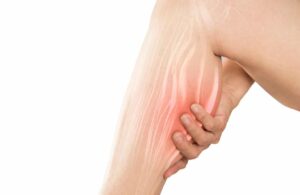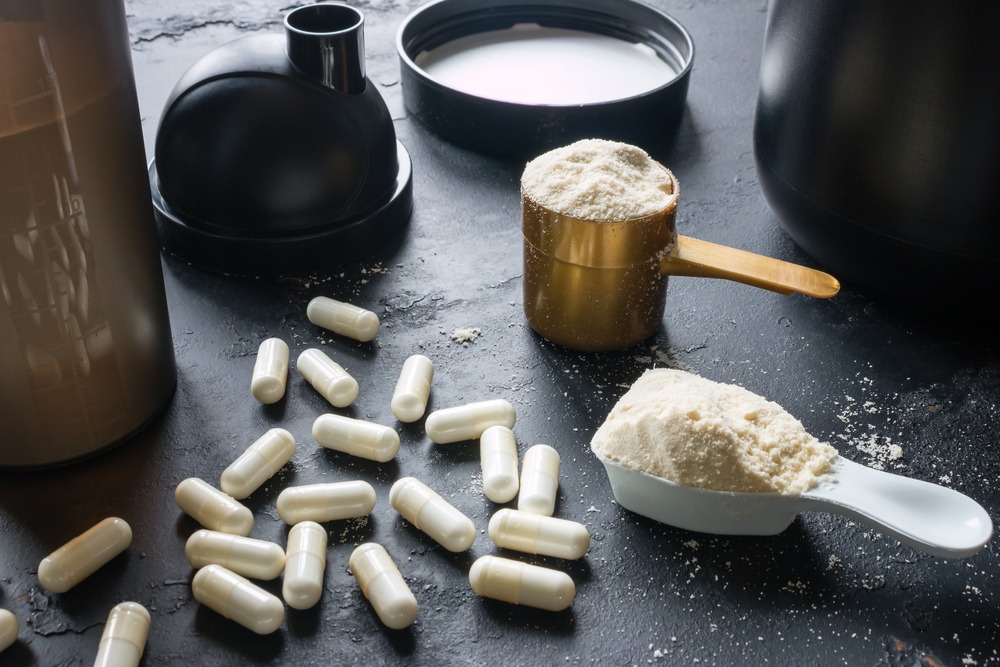There is a lot of debate surrounding creatine. Some people swear by it, while others claim that it makes them gain weight and feel bloated. So, what’s the truth? Does creatine make you fat? In this blog post, we will take a look at the science behind creatine and discuss whether or not it actually causes weight gain.
Contents
What Is Creatine?
 Creatine is a substance that is found naturally in the body. It is also found in some foods, such as red meat and fish. Creatine is often sold in powder form as a dietary supplement. The body uses creatine to make a substance called ATP (adenosine triphosphate). ATP is responsible for providing energy to the muscles.
Creatine is a substance that is found naturally in the body. It is also found in some foods, such as red meat and fish. Creatine is often sold in powder form as a dietary supplement. The body uses creatine to make a substance called ATP (adenosine triphosphate). ATP is responsible for providing energy to the muscles.
Creatine has been shown to increase muscle mass and strength. It is also effective in treating other conditions, such as heart failure and Parkinson’s disease. When creatine is consumed, it is converted into phosphocreatine. Phosphocreatine is stored in the muscles and used for energy during exercise. This leads to an increase in muscle mass and strength.
Sources Of Creatine
Some of the creatine in your body is produced naturally, while the rest comes from the food you eat. Creatine can also be taken as a dietary supplement. The creatine found in supplements is usually synthesized in a laboratory and is identical to the creatine found in the body.
Following are some creatine-rich foods:
- Red meat
- Fish
- Chicken
- Eggs
These foods are all high in protein, which is necessary for the body to synthesize creatine. If you are not eating enough protein-rich foods, you may not be getting enough creatine.
You can also get creatine from dietary supplements. Creatine supplements are available in powder and capsule form. The powder can be mixed with water or juice and taken orally. Creatine capsules can be swallowed whole with water.
Does Creatine Make You Fat?
Now that we know what creatine is and where it comes from, let’s address the question: does creatine make you fat? The short answer is no. Creatine does not make you fat. In fact, creatine can actually help you lose weight.
One study showed that creatine supplementation led to greater loss of body fat in athletes who were following a weight-loss program. In this study, the athletes were given creatine for eight weeks while they followed a calorie-restricted diet. The creatine group lost more body fat than the placebo group.
Another study looked at the effects of creatine in sedentary adults who were following a weight-loss program. This study found that those who took creatine lost more fat and gained more muscle mass than those who did not take creatine.
These studies clearly show that creatine does not make you fat. In fact, it can actually help you lose weight. So, if you are looking to lose weight, creatine may be a good option for you.
Benefits Of Creatine
In addition to weight loss, creatine has a number of other benefits. Here are some of the most well-known benefits of creatine:
Increases muscle mass and strength
Muscle mass is the amount of muscle in your body. Strength is the force that your muscles can produce. Creatine has been shown to increase both muscle mass and strength. In one study, creatine supplementation led to an increase in muscle mass of about 0.86 kg (two pounds) and an increase in strength of about 15%.
Reduces fatigue
Fatigue is the feeling of tiredness or exhaustion. It can be caused by physical, mental, or emotional stress. Creatine has been shown to reduce fatigue and improve performance in athletes. It does this by reducing the levels of ATP in the muscles. This leads to an increase in energy production and a decrease in fatigue.
Improves exercise performance
 Exercise performance is the ability to perform physical tasks. Creatine has been shown to improve exercise performance. In one study, creatine supplementation led to an increase in the bench press and leg press strength. This led to an improvement in exercise performance. Creatine has also been shown to improve sprinting performance which is an important component of many sports.
Exercise performance is the ability to perform physical tasks. Creatine has been shown to improve exercise performance. In one study, creatine supplementation led to an increase in the bench press and leg press strength. This led to an improvement in exercise performance. Creatine has also been shown to improve sprinting performance which is an important component of many sports.
Enhances brain function
Brain functions are the processes that allow the brain to perform its tasks. Creatine has been shown to enhance brain function. In one study, creatine supplementation led to an improvement in memory and intelligence. This suggests that creatine may be beneficial for those with Alzheimer’s disease or other forms of dementia.
Supports heart health
Heart health is the ability of the heart to function properly. Creatine has been shown to support heart health. In one study, creatine supplementation led to an improvement in blood pressure and heart rate. This suggests that creatine may be beneficial for those with high blood pressure or heart disease.
As you can see, creatine has a number of benefits. It is important to note that creatine should not be used as a substitute for medical treatment. Creatine is a supplement and should not be used to replace medication.
Side Effects Of Creatine
Creatine is generally safe and has few side effects. Some of the most common side effects of creatine include:
Upset stomach
An upset stomach is the most common side effect of creatine. This is usually due to the fact that creatine is taken on an empty stomach. To avoid this, it is recommended that you take creatine with a meal or snack.
Dehydration
Dehydration is a serious side effect of creatine. This is because creatine causes your body to lose water through increased urination. It is important to drink plenty of fluids when taking creatine to avoid dehydration.
Muscle cramps
 Muscle cramps are defined as involuntary and often painful contractions of muscles. creatine has been shown to cause muscle cramps in some people. To avoid this, it is recommended that you stay hydrated and warm up before exercise.
Muscle cramps are defined as involuntary and often painful contractions of muscles. creatine has been shown to cause muscle cramps in some people. To avoid this, it is recommended that you stay hydrated and warm up before exercise.
Nausea
Nausea is the feeling of sickness or discomfort in the stomach. Creatine may cause nausea in some people due to its effect on the stomach. To avoid this, it is recommended that you take creatine with a meal or snack.
Diarrhea
Diarrhea is the condition of having loose or watery stools. Creatine may cause diarrhea in some people as it can act as a laxative. To avoid this, it is recommended that you take creatine with a meal or snack and avoid taking it before bedtime.
Bloating
Bloating is also one of creatine’s side effects. Creatine causes the body to hold on to water, which can lead to bloating. You should avoid taking creatine if you are prone to bloating.
These side effects are most likely to occur when you first start taking creatine. They are usually mild and go away on their own. If you experience any of these side effects, it is recommended that you stop taking creatine and see a doctor.
Tips To Increase The Effectiveness Of Creatine
There are a few things you can do to increase the effectiveness of creatine. Here are some tips:
Take creatine with a meal or snack
Taking creatine with a meal or snack can help to avoid side effects such as upset stomach and nausea. It is important to make sure that you are taking creatine with food that is high in carbohydrates as this will help to increase creatine uptake.
Drink plenty of fluids
Drinking plenty of fluids is important when taking creatine. This is because creatine can cause dehydration. It is recommended that you drink at least eight glasses of water per day when taking creatine. Staying hydrated will also help to prevent muscle cramps.
Take creatine with other supplements
Taking creatine with other supplements can help to increase its effectiveness. Some of the best supplements to take with creatine include:
- Protein powder
- BCAAs
- Beta-alanine
Follow the recommended dosage
It is important to follow the recommended dosage of creatine. Taking too much creatine can lead to side effects such as diarrhea and bloating. The recommended dosage of creatine is 0.03 grams per pound of body weight. For example, if you weigh 150 pounds, you should take approximately four and a half grams of creatine per day.
Warm up before exercise
 Warming up before exercise is important as it can help to prevent muscle cramps. A good warm-up will also help to increase blood flow to the muscles, which can improve creatine uptake. It is recommended that you do a light workout or jog for five to ten minutes before starting your creatine regimen.
Warming up before exercise is important as it can help to prevent muscle cramps. A good warm-up will also help to increase blood flow to the muscles, which can improve creatine uptake. It is recommended that you do a light workout or jog for five to ten minutes before starting your creatine regimen.
Avoid taking creatine before bedtime
Taking creatine before bedtime can lead to insomnia and disturbed sleep. It is important to take creatine at least four hours before you go to bed to avoid these side effects. It interferes with the production of melatonin, which is a hormone that helps you to sleep. That is why you should avoid taking creatine before bedtime.
If you follow these tips, you should be able to avoid the side effects of creatine and experience its benefits.
Conclusion
Creatine is a very effective supplement for increasing muscle mass and strength. However, there is no evidence that creatine makes you fat. In fact, creatine may even help you lose fat by increasing your lean body mass and improving your exercise performance. If you are concerned about putting on weight while taking creatine, be sure to monitor your calorie intake and body composition closely. Creatine is a safe and effective supplement for most people when used as directed.
For more information on health and weight loss-friendly supplements, contact Mantra Care. We can help you develop a healthy weight loss program that is tailored to your specific needs and goals. You can also consult with a registered dietitian or nutritionist through our online nutrition counseling program if you have any questions or concerns about starting a new diet or exercise.


